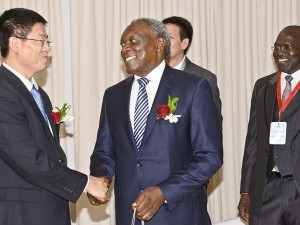
Huawei has selected South Africa to be home to its seventh global innovation centre.
Yesterday, the ICT solutions provider in partnership with the Department of Telecommunications and Postal Services (DTPS) opened Africa's first Huawei Innovation and Experience Centre in Johannesburg.
With an investment value of R72 million, the innovation centre is set up to enhance local ICT skills, create jobs and secure SA's position as the continent's ICT hub.
Speaking at the launch event yesterday, Huawei's president of the East and Southern Africa region Li Peng said the innovation centre will serve as an exhibition of company solutions, an open lab to university students and an incubation centre for upcoming ICT enterprises.
According to Peng, Huawei's investment in innovation in SA and other African countries is steadily increasing. "The innovation centre is not only a platform for Huawei to showcase the latest ICT solutions but also a centre to enable SA telecoms operators, government agencies and enterprise customers to experience new business models and applications in a real-time environment.
The top priority for the African continent is to build digital infrastructure, which will serve as a platform for digital innovations, he said. "The innovation centre will contribute to ICT development in the region."
Govt steps up
As part of the launch of the Huawei Innovation and Experience Centre, the DTPS and Huawei signed a cooperation contract that is dedicated to areas such as capacity building and training ICT talent.
South Africa often faces criticism for its laid back approach to developing the ICT skills of local people and the lack of implementation of programmes that will provide connectivity to citizens.
In terms of the National Development Plan (NDP), government has undertaken to connect its offices across the country, starting in the rural areas, to ensure that South Africans have access to the most modern communication tools and services.
The government programme SA Connect has been identified as the project that will meet the technology goals of the NDP to create an inclusive information society.
DTPS minister Siyabona Cwele recently admitted that his department requires 'creative connectivity solutions' for the rollout of the government broadband project.
The cooperation agreement between the DTPS and Huawei is expected to help the department implement programmes, including the rollout of broadband and lowering the cost to communicate, stated Cwele.
"Another programme that should benefit from this cooperation should be our e-Strategy that will provide a framework of how the country will include the youth, women, people with disabilities and small and medium sized business in the ICT sector," he said.
Up-skilling
This week, Wits University's Joburg Centre for Software Engineering (JCSE) released its annual ICT skills survey. The survey is a representation of SA's ICT skills landscape and provides an outline of the current skills priorities and gaps in the sector.
Adrian Schofield, JCSE's manager of Applied Research and author of the report, says the survey shows SA continues to fall behind its African peers.
In a statement, Schofield says the lack of improvement in SA's basic education remains a major concern.
"Exposure to and familiarity with ICT for all learners is essential. Some laudable initiatives have appeared, such as the use of tablets in Gauteng schools, but they have yet to reach a sustained, critical mass for all grades of learners."
By setting up the innovation centre Huawei plans to work closely with the DTPS to fulfil the target of training 1 000 youth in ICT skills. This is part of the talent training component of the agreement to help the department promote ICT literacy and awareness in the country.
Huawei is already working with the State Information Technology Agency to train about 150 students this year and they will form part of the 1 000 students that will be trained in the next five years, while other students will be taken from the universities that the company has partnered with.
According to Cwele, the youth will be trained in areas that include telecommunications network security and optimisation, satellite navigation technology, next generation network construction, cloud computing and big data network construction.
"I am pleased that Huawei has committed to providing training opportunities to 1 000 young South Africans over the next five years," said Cwele. "This training will take place in China. I urge the South Africans who receive this opportunity to use it wisely. They must view it as a window into the future and must come back and develop ICT solutions that will answer some South African challenges," he noted.
Share